All historical arguments contained or referred to in this article are solely for exam preparation and do not necessarily reflect the view of the author.
Introduction
This article includes:
- Steps for IB DP History paper 2 revision;
- Some extra tips (they can’t really fit into the steps);
- Study resources;
- My brief essay outlines,
which worked together to help me reach a 7 on paper 2 in my M21 history SL final exam.
This article works best for:
- Final exam prep;
- Short-term revision;
- Developing exam skills, not necessarily historical skills;
- SL students who need to know just enough for paper 2, not any more content for paper 3.
This article uses topic 10 authoritarian states (20th century) as an example.
In my blog article “Short-Term Revision”, I mentioned some of my experience preparing for the DP History final exam. I’ll try not to repeat too much of that here.
TL;DR is at the end of this article.
Step 1: Learn the syllabus
Learn the syllabus by heart.
For example, this is the IB syllabus for topic 10 authoritarian states:
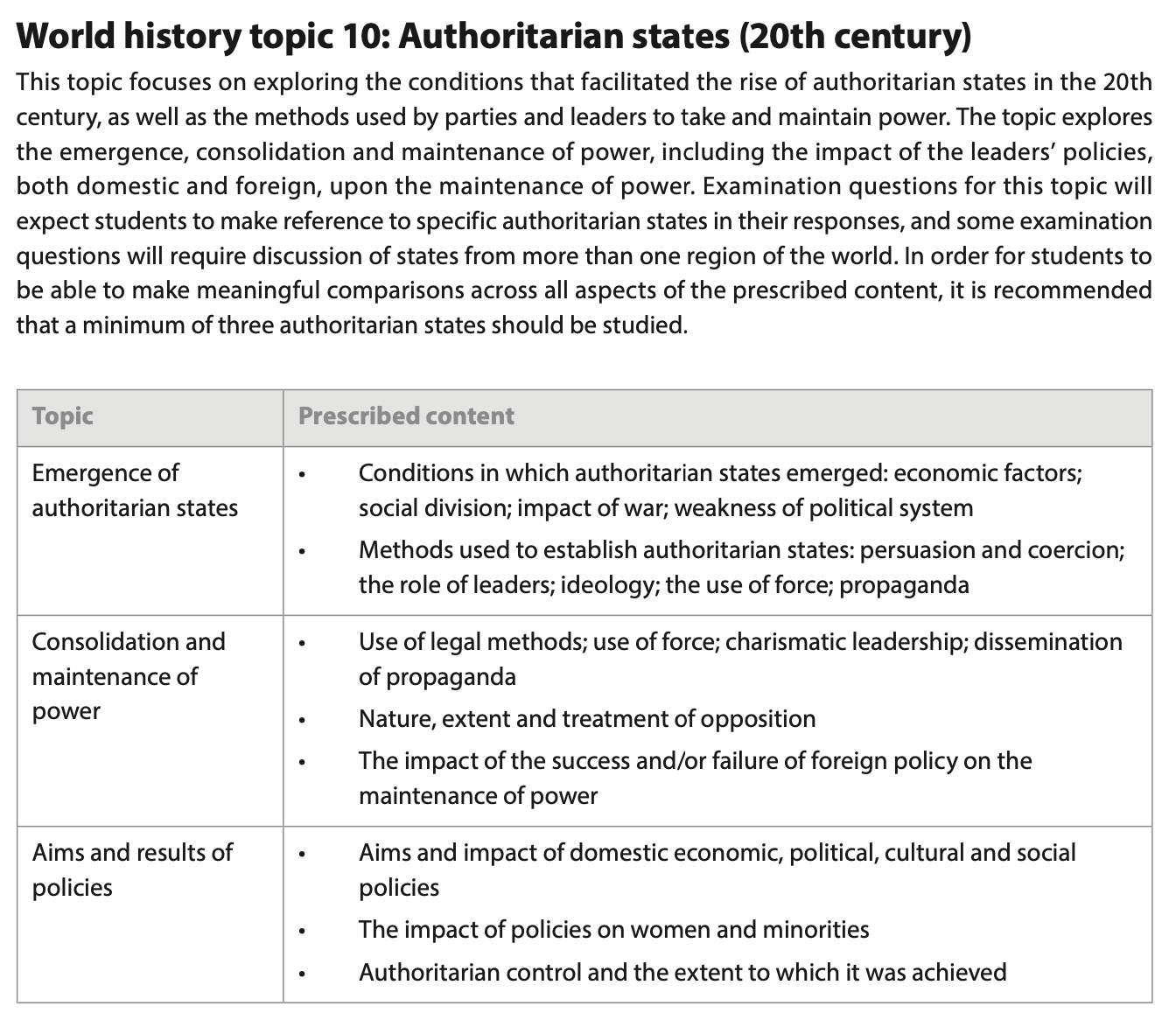
Completing this revision step means that you can recall exactly what’s in the table. By that, I mean every single word in the table. Do make sure you read the description paragraph above, too, but you don’t need to learn it by heart.
Once you do this, every time when you come across a fact, a historical event, or a historiography, you can immediately identify the sub-topic you can use it for in an essay. Then, you can easily think about your arguments and try to structure your essays every time you revise factual information.
Step 2: Study the past paper questions
Look at the past paper questions to see what have already been asked, and when. The IB questions don’t tend to repeat a lot, especially not in successive exam sessions. This means you can guess the questions that are likely to come up on your exam paper, althugh officially, the IB discourages doing this.
Here are all the past paper questions summarized in one document, both organized by year and by syllabus theme:
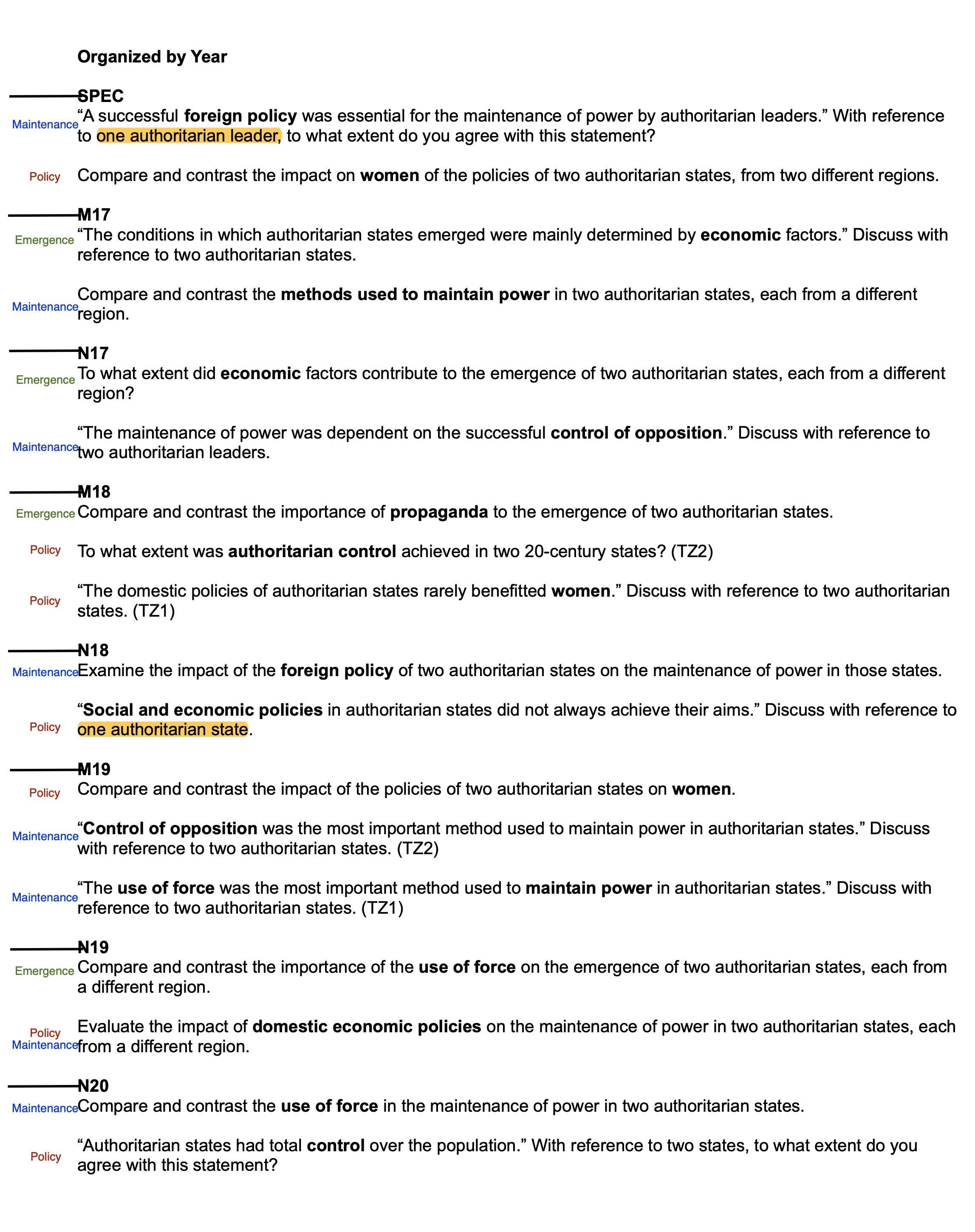
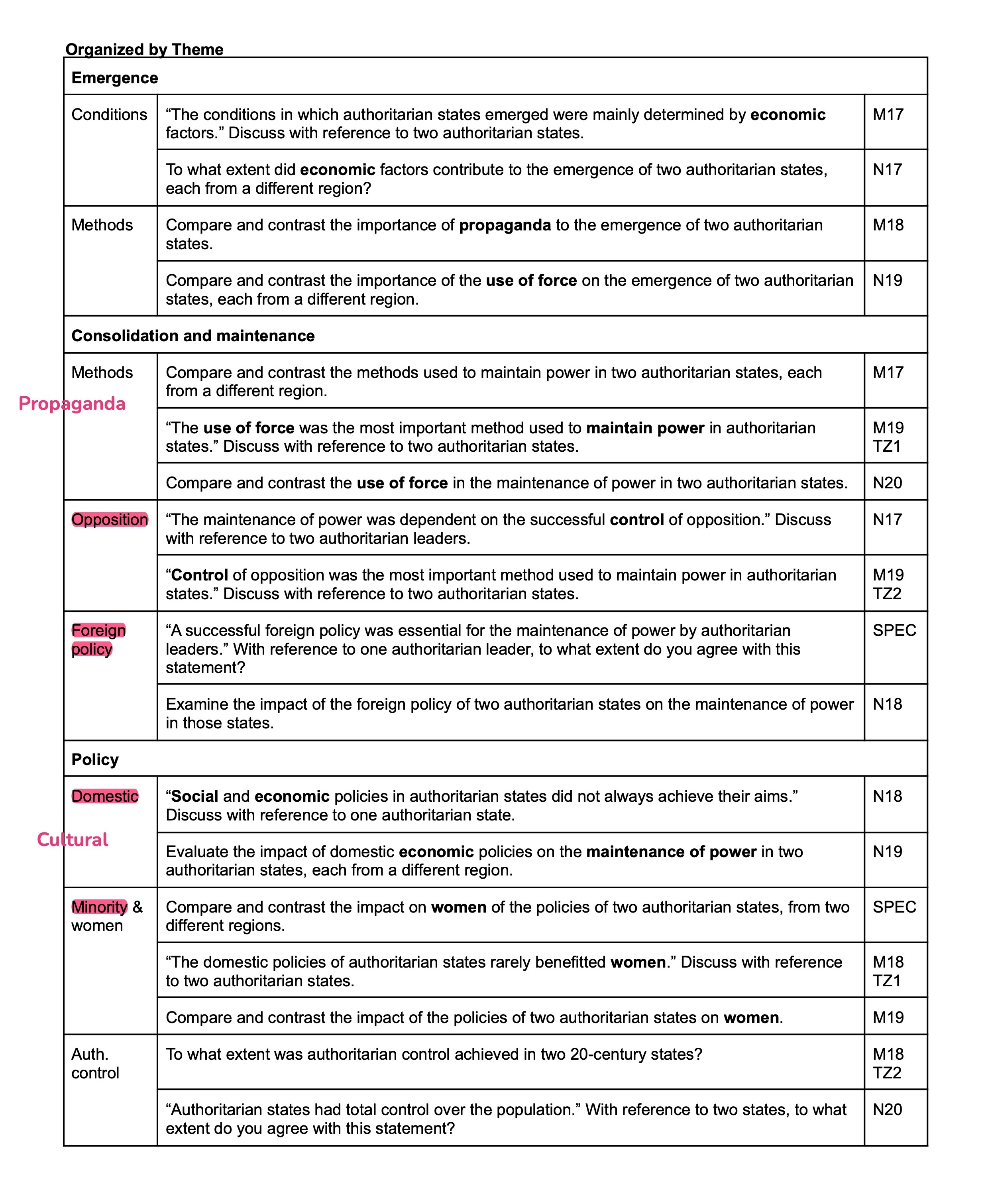
You can download the document as an annotated PDF here, or access it here as a google doc without annotations.
This document doesn’t include the M21 questions, because I made it for my own revision before M21. The M21 TZ2 questions for topic 10 roughly stated:
- Evaluate the impact of foreign policy on the maintenance of power in two authoritarian states.
- “Full control was not always achieved in authoritarian states.” Discuss with reference to two authoritarian states.
According to this thread on Reddit, treatment of opposition instead of foreign policy came up for TZ1.
What I found was that:
- Almost every sub-topic appeared fewer than twice in past papers.
- There’s usually a gap of around 2 exam sessions (e.g from M18 to N19) between the questions under the same sub-topic.
- The past paper questions (not counting the specimen papers here) never repeat exactly. They can be similar, but always with a slightly different emphasis.
- Usually, only 2 of the sub-topics (emergence, maintenance, and policy) appear in one exam session, except for once in N19 where question 2 was on both maintenance and policy.
- The appearance of sub-topics is quite balanced.
- It’s very rare that a question asks for only one authoritarian state—only happened twice. (Highlighted in yellow.)
- A few questions have appeared only once or never.
So I made guesses based on the findings and other information, and altered my revision plans:
-
I chose to ignore emergence and turned to focus on the other two sub-topics. My thinking process is outlined in a section of my blog article “Short-Term Revision”.
-
The things in pink are what I thought, when I was revising, that would be likely to come up. They were either questions that had never come up before under the current syllabus, or those that had only come up once. Most of them also fitted in the “2 exam session gap” time frame. Those were my priorities.
-
Apart from these, I was convinced that preparing for compare and contrast, or at least formulating arguments for two states, would be necessary.
Step 3: Read, write, and think!
Take concise, structured notes for every topic that you revise, especially those that are likely to come up based on what have been asked before. But only take notes if you know you can use them to support your arguments, or you’ll just waste time.
You can follow a textbook to save your time researching, which I found to be extremely helpful. I have talked about some history textbooks in this blog post: My Experience & Tips for IB Textbooks: History SL.
As you take notes, also write down thoughtful arguments. If you’re like me who wants to be safe, you can do that for every single possible essay question. Knowing the syllabus by heart helps a lot here, because that helps you formulate your own IB style questions quickly.
Try to come up with counter-arguments and then counter those counter-arguments to strengthen your original arguments. Add the “debates” into your essay, even if those are just your thoughts going back and forth.
I find it helpful to write out complete sentences when I work on my arguments. That helps me to clear up my own ideas and saves me time structuring my sentences during a tight essay exam. Then, I recommend that you condense the arguments so that you can remember them. I also prefer typing over writing on paper because I can write much faster by typing, and I can organize digital files better than physical ones.
As an example, I wrote a 3-line outline for every essay question I could think of. Each line (out of the 3 lines) summarizes a paragraph in my essay. Of course, this is after thinking about or writing out more detailed notes for my arguments and supporting evidence. This is a preview:
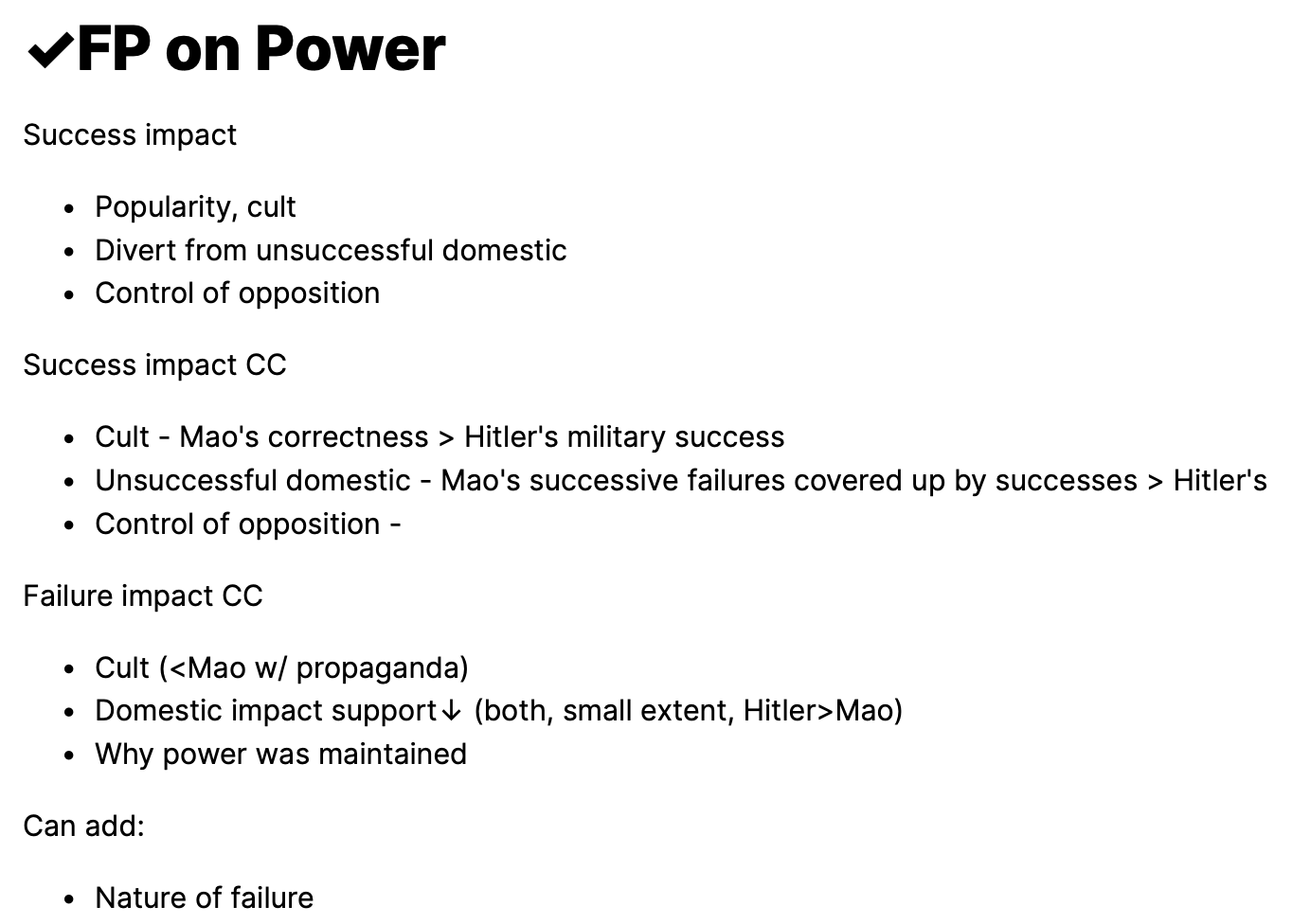
You can download the complete PDF document here. Unfortunately, I don’t have any detailed notes because I lost a lot of data on my laptop during a system update.
There’re a lot of my own short-hand notations in the document. So if you do use this to revise and find something confusing, don’t hesitate to ask me in the comments or via email (see the end of my “About” page). I’ll try my best to recall what I meant.
To emphasis, I repeat: all historical arguments contained or referred to in this article are solely for exam preparation and do not necessarily reflect my view.
Step 4: Get more examples & ideas
This step can be done together with step 3. Sometimes you might run out of ideas or get confused about what kind of arguments the IB likes. Reading more essays can help. Especially, the good ones can give you some inspiration, as well as some excellent arguments to agree with or argue against in your own essay.
Some places to get example essays:
- Textbook appendices
- History teacher support material. I focused on studying the topic 10 essays in these two examples:
- P2 Example 18, scored 13/15
- P2 Example 19, scored 13/15
- Your school teacher
- Your own paper 2 practices over the 2 years
- Your classmates' essays
I recommend that you get a physical copy of each example essay along with examiner’s comments (if any), so that you can read and annotate it carefully.
If you can’t find existing essays, write them yourself! Write full essays, paragraphs, introduction, even just a short thesis, and kindly ask your teacher for feedback. Try out new writing approaches because you might find better ways to write. You don’t have to time yourself while writing these. At this point, getting feedback is the most important because it helps you improve and further develop your skills and arguments!
To get ideas for essays, you can also look at the indicative content in IB markschemes. The indicative content tends to be more detailed for papers testing the old syllabus (before first assessment 2017) but the new markschemes can also give you some hint.
Step 5: Know your time during the exam
Get used to the exam environment by practicing timed paper 2 exams. But it’s fine if you do it at the very end of your revision, because knowing what to write can help you write faster than doing anything else, including doing timed paper 2 exams.
However, it’s still important to plan your time prior to the exam and closely follow the plan. In this way, during the exam, you can stay calm so you don’t rush or forget about your arguments.
As an example, this is my plan, with all time and durations in minutes:
| Task | Total time incl. current task | Duration |
|---|---|---|
| Mental outline | 0 | 5 (5-minute reading time) |
| Written outline | 5 | 5 |
| Intro | 10 | 5 |
| Paragraph 1 | 20 | 10 |
| Paragraph 2 | 30 | 10 |
| Paragraph 3 | 40 | 10 |
| Conclusion | 45 | 5 |
At the very beginning of my exam, I quickly calculated the exact time when I would need to finish each task. For example, if the reading time started at 8:33, I would calculate that I would need to finish my mental outline at 8:38, my written outline at 8:43, my intro at 8:48, etc. I wrote down the minute digits on a scratch paper so that during the exam, I could quickly check if my progress matched my plan.
Other tips
Historiography?
It is possible to get to 12/15 with only a name-dropping of a historian and his/her argument. True personal story. I did that on my final exam.
Take a look at the example paper 2 essays in the Teacher Support Material, too, especially examples 18 and 19. (I’ve mentioned them above.) No historiography, no quoting of historians, but, bang—they both got 13/15 for the topic 10 question.
As long as there are decent original arguments in an essay, the lack of historians' views is fine, unless you’re aiming for 14 or 15 marks. This really alleviated a lot of stress for me.
What to aim for
You don’t need to have a 7 in every single component to get an overall 7.
This is how I did my calculation before I took my M21 exams.
I used the IB M19 boundaries for SL TZ2, which was the most recent May exam-route session with available grade boundaries:

Using the modified marks and weightings in M21, I calculated that the number of marks needed to get a 7 for paper 2 was 12/15.
So I calculated that if I got:
- IA: 20/25,
- Paper 1: 17/24,
- Paper 2: 12/15,
then my total scaled score (out of 100) would be $\frac{20}{25} \times 25 + \frac{17}{24} \times 30 + \frac{12}{15} \times 45 \approx 77.3 %$, which is higher than 74, the boundary for getting an overall 7.
This is true for N20 and M18, too, and should be true for most exam sessions.
Let’s continue to use M19 as our example. The boundary for an overall 7 is slightly lower, so one can afford to lose one or more points. The following combination of marks can all give an overall 7.
| IA | P1 | P2 | Overall |
|---|---|---|---|
| 20 | 17 | 11 | 74.3 |
| 18 | 16 | 12 | 74.0 |
Try calculating the overall result for different combinations and choose to work towards the one that seems the most realistic for you. Once you know what marks you need in each component, you have a more specific and a more accomplishable goal.
Notice that because paper 2 is weighted the more heavily (45%), getting a reasonably high mark on paper 2 is more important than on paper 1 or IA.
How to write faster by hand
You don’t have to write prettily, or even clearly—as long as it’s legible in the context. This is my hand-writing at full speed:
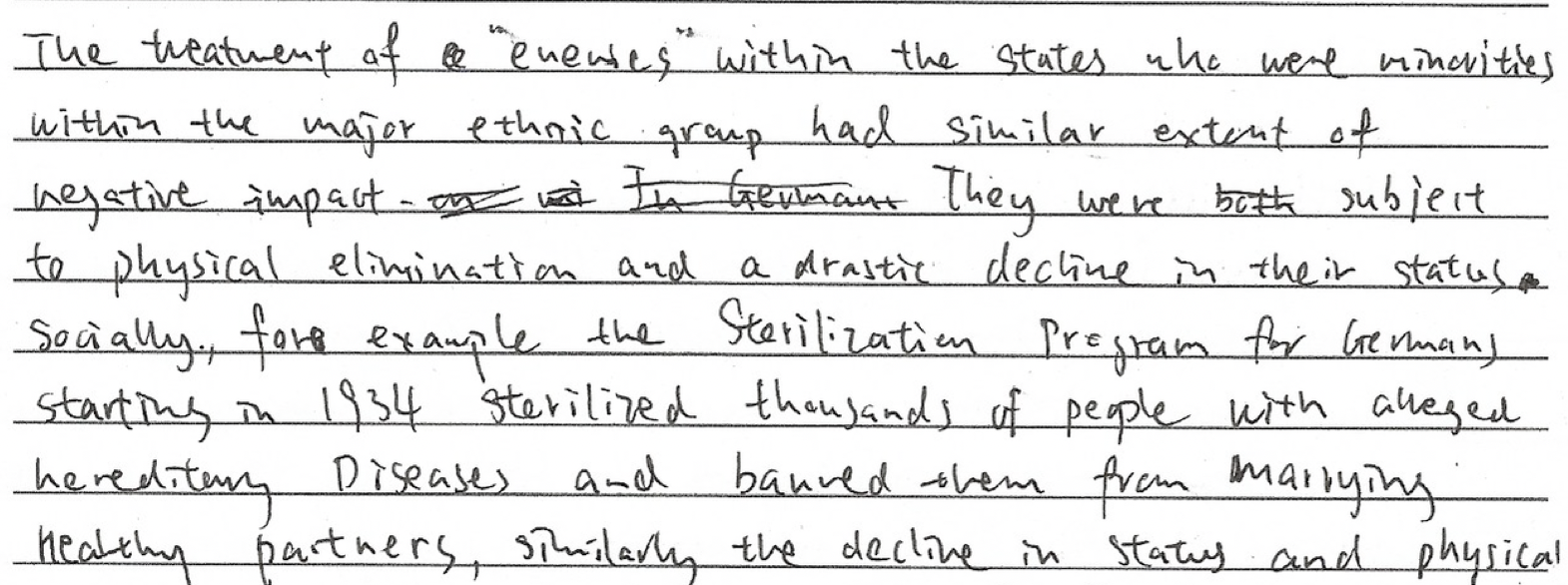
Both my teacher and the examiner grading my final exam papers managed to recognize my writing.
Pick a pen in which the ink can flow smoothly and which you don’t need to press hard on the paper to write with.
If your pen has a cap, leave it off the end of the pen. It takes you more effort to move the pen when the cap is attached to the end, especially when you write a lot. I learned this from this YouTube video.
How much to write
4 sides (on A4 size paper) should be enough. I even wrote only 3 sides several times and that was fine. Quality over quantity.
When we had timed, in-class summative assessments, I almost never managed to finish my essays.
And, although I usually wrote only a few sides, although I couldn’t really finish the essays, I could still get 10-12 marks out of 15. So, absolutely no worries if you can’t finish your essays or you only write 3 sides.
Notes
Feel free to ask me any questions in the comments or via email (see the end of my “About” page). I might share a few of my own history essay practices in the future but that’s not guaranteed 😅
TL;DR
- Learn by heart exactly what’s covered in the paper 2 topic you’re studying.
- Look for patterns in the past paper questions and prioritize the ones that you think are likely to come up.
- As you take notes for the possible essay questions, develop strong arguments that can stand counter-arguments.
- Read exemplar/example essays and indicative content in IB markschemes. Write your own essays/paragraphs and ask your teacher for feedback if you can’t find others' essays.
- Plan how much time you’ll use for each paragraph beforehand, so you don’t panic during an exam.
- You don’t need historiography to get to 12/15 (or you only need to name-drop one or two historians if that counts).
- You don’t need all 7s in all component to get an overall 7. Calculate how many marks you need to get the overall grade that you want to narrow down your goal.
- To write faster, use a smooth, light-weight pen. It’s alright to have messy (but legible) hand-writing.
- It’s fine if you write 3-4 sides on A4 size paper or you can’t finish your essays.
